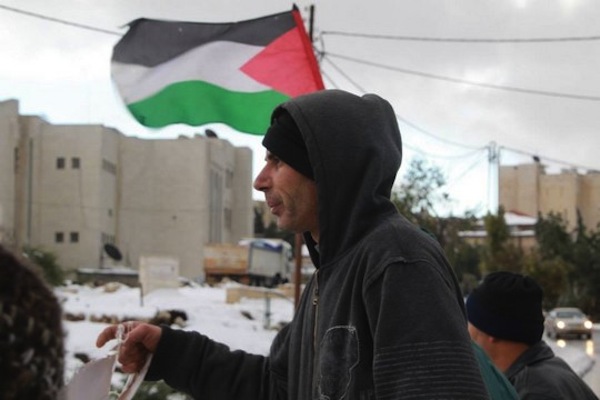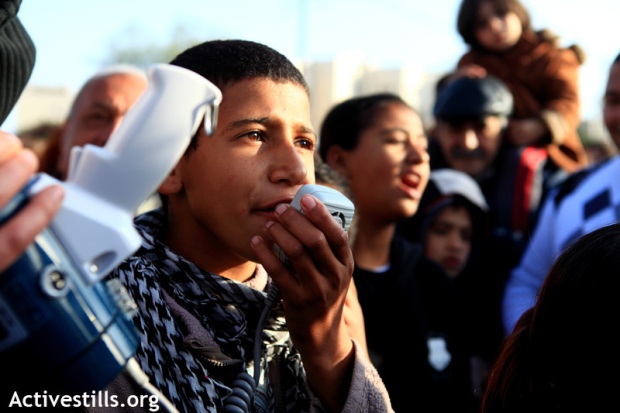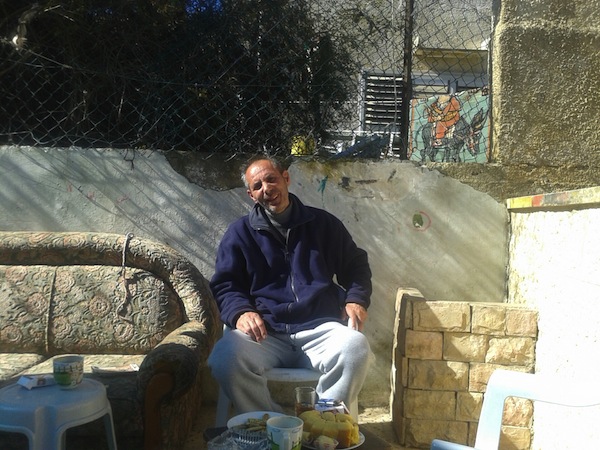Salah Diab, one of the leaders of the struggle against expulsions of Palestinians from the Sheikh Jarrah neighborhood in East Jerusalem, was released from prison after serving five months for a crime he says he didn’t commit. Now that he has returned to the neighborhood, he is as sure as ever: the future belongs to the Palestinian people, not the settlers.
It was nearly four-and-a-half years ago that Salah Diab, a resident of the East Jerusalem’s Sheikh Jarrah neighborhood, heard noises outside his door. He went outside to see what was going on, taking his camera with him, as did regularly during those days. When he opened the door, Diab saw a crowd of settlers accompanied by policemen and began photographing. What happened after that eventually led to him serve a five-month sentence in an Israeli prison, after having a third of his sentenced commuted due to good behavior.

“When I heard the noise outside, I went out in my shorts to see what was happening. I saw the settlers and the police and began filming. All of a sudden, a policeman came up to me, asked for my ID and says “you’re coming with us.” When I asked why, he said “you’ll find out at the police station.”
“At the station they handcuffed my hands and my legs, put a laptop in front of me and said ‘watch.’ In the video I see three or four men arguing with a settler and then beating him. I asked how this had anything to do with me. ‘Here you are,’ they responded. ‘Where?’ I asked, and they showed me a man with his back turned to the camera. ‘Here, the tall, skinny man. That’s you.’ ‘Are you kidding me?’ I responded, ‘this is why you took me from my home and handcuffed me?’
“They took me to the Russian Compound [a police station and jail in the heart of Jerusalem], where they detained me three times for a period of 24 hours. During the hearing they said I was a dangerous person and that the man whom I attacked had to go to the hospital. I told them that I only get home from work around 9 p.m., but the camera shows that incident took place at 8:15 p.m. They left me there for three more days, and after that I was released on bail.
“After two years, my lawyer calls and says, “they like you there – you’ll have a court hearing.” We went. They brought all the settlers and policemen who attended the weekly Sheikh Jarrah protests as witnesses. They told lie after lie. The video showed six attackers, but I was the only person detained.”
“The just sent me to a probation officer in Be’er Sheva. I went and spoke to him. He said, ‘Diab, you are not the kind of person who goes to jail, you’re not a criminal. I will make a recommendation for you.’ We went back to the judge. I think that she understood that I was being framed, but she could not do a thing, since the Shin Bet was out for me. I saw how she tried to help, and gave me five months of community service and three years of probation.”
Property rights: Israel’s pandora’s box
As strange as it may sound, anyone who knows about how the police behave in East Jerusalem knows that Diab’s story doesn’t sound so out of the ordinary. Visits to the Russian Compound followed by trips to the courthouse are commonplace in every Palestinian neighborhood where one of the activists is targeted for being the local leader. When one comes to look for Juad Siam, one of the prominent, young activists in the Silwan neighborhood, the first question will always be: “Is he inside or outside?”

And Salah is without a doubt a local leader. He has been attending the weekly protests in Sheikh Jarrah for nearly five years – always smiling, giving coffee and sweets to the demonstrators and talking about the latest updates in the neighborhood.
Between 2010-2011, the Friday protests brought hundreds of people to Sheikh Jarrah on a weekly basis. The protests grew steadily, perhaps due to the police’s excessive violence against the demonstrators, which was able to shock even many armchair activists.
Or perhaps the galvanizing power of the protests was due to the severity of the injustice that took place there. The state expelled Palestinian residents from their homes after former Jewish residents filed legal claims to the properties they owned before 1948, while refusing to even discuss the rights of the Arab residents’ rights to the land from which they were expelled upon the state’s formation.
Or perhaps there was a fear of opening the pandora’s box of discussing land and property ownership from before 1948. This, of course, is the basis of the entire Israeli-Zionist premise: in 1948 we turned over a new leaf, and if the state begins discussing cases of land ownership from before 1948 in order to dispossess Palestinians, who knows how long they’ll be able to prevent Palestinians from demanding their properties in Jaffa, Haifa and Talbiyeh from before 1948 by implementing discriminatory legislation.
First day of school, first day in jail
Either way, Salah appealed the District Court’s decision. After all, even a Palestinian from East Jerusalem cannot be convicted solely due to the fact that he is tall and skinny. Or at least he thought; the judges sentenced Saleh to eight months in prison, beginning on September 1, 2014. The first day of school.
“That morning took my kids to school and told them ‘when you come home, you won’t see me here for a while.'”
He has a hard time talking about the months he spent on the inside. Something has changed since the last time I saw him at the last protest before his prison stint.
“I’ll tell you the truth, it was difficult. At night when I put my head on the pillow, I saw things play out in front of my eyes. I thought about the violence I had brought into the lives of my children, the violence that I had brought into your lives – my friends and supporters who worried about me on the outside, and who continued to attend the weekly demonstrations in the neighborhood. The violence that I had brought into my parents’ lives.”
“I lived in the same room as a 25-year-old man from Jerusalem’s Mount of Olives, who had a very severe psychiatric illness. I spent a lot of time supporting him. I didn’t leave the room for the first three months. He would smoke three-and-a-half packs a day, and if he didn’t have any cigarettes he would hit himself as well as me. Every day he would run around the room screaming. One night, when we were laying down to sleep on our bunk beds, he leaned down and said, ‘Salah, I am sorry for the trouble I have caused you. Forgive me, I am asking for forgiveness.’ That was the most difficult moment for me in prison.”
The youth are our future
We sit in his yard, adjacent to the al-Kurd family home – one of the first ones to be evacuated and taken over by settlers. Several years ago, around the time Israelis were celebrating the Jewish holiday Purim, the settlers put speakers in the middle of the street and began singing songs of praise for Baruch Goldstein, the Israeli who murdered 29 Muslim worshippers at Hebron’s Cave of the Patriarchs in 1994. The Ghawai family, who were kicked out of their home around the same time, sat for months in a tent across the street, watching as the settlers lived in their home. I look at the Ghawai home’s roof: the Israeli flag is no longer there, but the giant menorah is still standing.

Meanwhile, some of the younger residents arrive to congratulate Salah on his release. Five high schoolers, holding their schoolbooks, came straight from school. They shake his hand in reverence, and wait on the side until he frees up to speak to them.
What do you say to the young people who come see you?
“The thing I repeat to them is that they are the ones who build the future, and that they must make sure that the occupation doesn’t drag them into bad things. That they must study, and study well. That the occupation is against us in everything. In prison I saw how 90 percent of our boys fall prey to drugs and theft. I tell the youth that that they must not give the occupation the opportunity to take them in for nothing. That they must study.”
What kind of future awaits them?
“The future is near. The future is good. I see it with my own eyes. Every person in this land is waiting for justice. Those settlers across the street – they’re stupid. The future is not with them. For years the world has given them everything they were wanted, and look, we’re still here. Did they expel us? They didn’t expel us. The future is with us.”
Did the weekly protests in the neighborhood change anything?
“Whoever says that our protests didn’t change anything is blind. First of all, even a smile and the love between us is enough. It gives power. What brings someone here from Tel Aviv in the rain, cold or snow? Love. And he who is just never breaks. It is difficult and can take a lot of time, but in the Quran it says that Allah is with those who have patience. Look at how your prime ministers fall prey to their own lies. This state is based on a lie, on theft. This will be its downfall.”
Are you disappointed that the protests have gotten smaller over time?
“Not at all. Look, everyone came last Friday after I was released. Good on them! We are here every week, and we will continue. The truth is that when I was in prison, I was afraid that the settlers might do something to the protesters. Every week I called to make sure that everyone is okay.”
“I have no words to describe how I feel about our Jewish friends who come here every week. Love. Excitement. They are the ones who hold us here. They give us a lot of strength. I am sure that because of you, the authorities haven’t kicked out more people.”
But even so, they are a small minority.
“I am sorry to say it, but the Israeli people are stupid. They think they are smart, but they are stupid. Look, soon you will have elections. And they choose the most racist people and think this is good for them, but they don’t understand how this racism only brings them more war and blood. You need to understand one thing: your leaders aren’t working for you, but for themselves. You are of no interest to them.”
“The Israelis need to understand that we are here and aren’t going anywhere. My father was from Jaffa – they expelled him and now I am here. I didn’t disappear. And if they expel me, my son will keep going after me. We will stay here until after the occupation.”
***
Now that he is back, Salah wants to return to his old life. His children’s grades dropped slightly while he was away, and it is important for him to work with them so that they go back to excelling in school. “But before all that, I need to deal with another court case.”
You’re kidding.
“Upon my release they handed me both my release letter and another summons for a court hearing. They said that in 2012 I called a policeman ‘racist,’ and that I hit a utility pole with a stick. Just my luck: turns out the pole was Jewish.”
This article was first published on +972′s Hebrew-language sister site, Local Call. Read it in Hebrew here.
Related:
Turning over a new leaf: An interview with a former Palestinian ‘security prisoner’
Hundreds protest against impending eviction of family in Sheikh Jarrah



